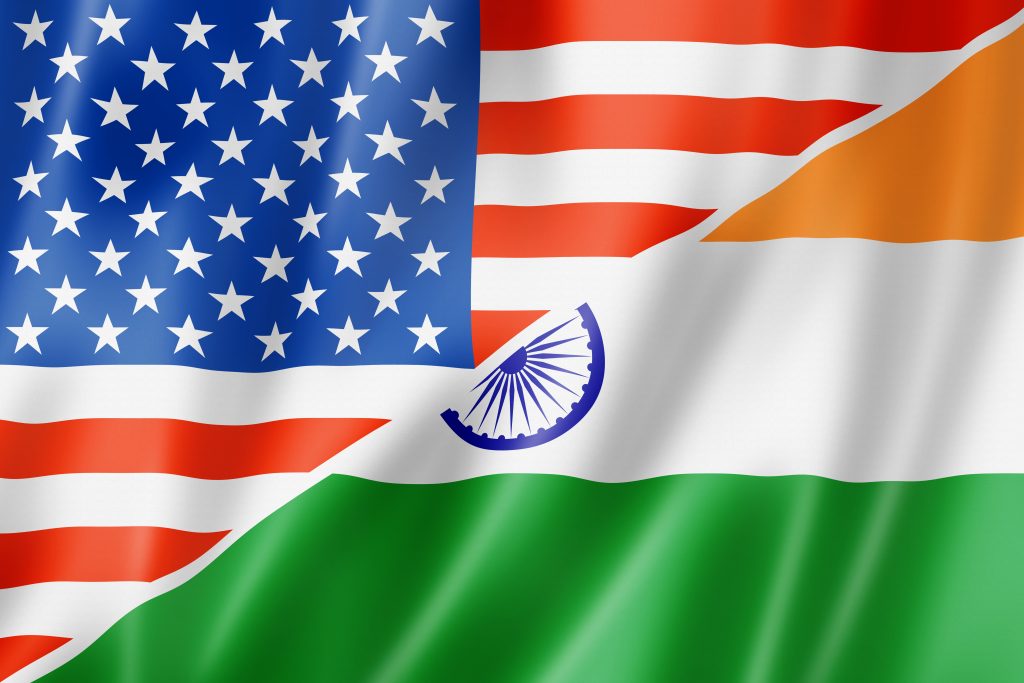“Among India’s achievements, the country has substantially increased the number of patent examiners and controllers to eliminate patent backlogs and speed up the application process. India has also made substantial changes to make it easier and cheaper for entrepreneurs and startups to file for protection.”
 In 2019, the first-ever United States-India collaboration on intellectual property rights (IPR) education was launched. Program participants included entrepreneurs, students, and academic faculty. The initiative brought together multiple governments and agencies for a blending of ideas and priorities that elevated the experience for participants and advanced U.S.-India relations. The outcome was a sense of U.S.-India ‘team’ in collaboration to advance the cause of intellectual property education in India.
In 2019, the first-ever United States-India collaboration on intellectual property rights (IPR) education was launched. Program participants included entrepreneurs, students, and academic faculty. The initiative brought together multiple governments and agencies for a blending of ideas and priorities that elevated the experience for participants and advanced U.S.-India relations. The outcome was a sense of U.S.-India ‘team’ in collaboration to advance the cause of intellectual property education in India.
The United States Consulate General Kolkata, India funded the creation of an IPR education initiative that included a series of webinars and a week-long series of summer workshops presented as the first United States-India Symposium on Intellectual Property Rights.
Workshops focused on the value, importance, and use of IPR as a driver of economic success. The program was promoted within the practitioner, academic, and business community through email, Facebook, LinkedIn, and other social media including distribution channels of the local partners.
The first workshop, “Intellectual Property Practice Principles,” for intellectual property practitioners, academics, and students of law and entrepreneurship was designed to enhance understanding of international IPR dynamics and convey the importance of intellectual property as drivers of the Indian economy.
Workshop two, “The Role in Intellectual Property in Business Transactions,” was directed toward entrepreneurs and business professionals to provide insights and tools on how to leverage IPR to succeed, grow and achieve competitive advantage, both in India and globally.
Both workshops were oversubscribed, indicating both a strong need and desire for this type of programming. Program outcomes were assessed by participant review which exceeded expectations, particularly with regard to the speakers who received a 90% or higher approval rating for both courses.
IPR Growth and Achievements in India
In 1994, India became a signatory to the World Trade Organization’s Trade Related Intellectual Property Rights Agreement (TRIPS) and began the process of working to elevate IPR law and practice to meet international standards. Two decades later, India has made substantial progress on its goal to achieve standards established by both TRIPS and by the World International Property Organization, of which India is also a member. India has become a Patent Cooperation Treaty International Search Authority as well.
Among India’s achievements, and according to the Office of the Controller General of Patents, Designs and Trademarks 2016-2017 annual report, the country has substantially increased the number of patent examiners and controllers to eliminate patent backlogs and speed up the application process. India has also made substantial changes to make it easier and cheaper for entrepreneurs and startups to file for protection.
In April 2019, a report from the Office of the U.S Trade Representative stated “Over the past year, India took steps to address intellectual property challenges and promote IP protection and enforcement. However, many of the actions have not yet translated into concrete benefits for innovators and creators, and long-standing deficiencies persist.” The report continued: “India’s commitment to bilateral dialogue remains strong, and the United States intends to continue to engage with India on IP matters.”
Finally, in keeping with India’s dedication to meet IPR standards and goals, on June 7, 2019 India acceded to three WIPO treaties: the Nice Agreement, the Vienna Agreement and the Locarno Agreement. “The accessions underline India’s strong multilateral engagement with the World Intellectual Property Organization,” said WIPO Director General Francis Gurry.
U.S. Consulate Kolkata IPR Program Goals
The Consulate awarded the grant to create an IPR program that underscores U.S. support of India’s efforts to grow the strength of its IPR ecosystem to the AUTM Foundation and Apio Innovation Transfer (APIOiX) with local support from the firm of Biswajit Sarkar Advocates – IP Attorneys. Program goals were:
- Strengthen people-to-people ties between the United States and India through exchanges of information, experiences and expertise.
- Provide hands on information to practitioners regarding intellectual property rights and protection policies for global partnerships.
- Build capacity and knowledge of Indian practitioners and create linkages with U.S.-based practitioners.
Symposium
The Symposium was opened with a speech by the Consul General of Kolkata, Patricia Hoffman, who highlighted the importance of intellectual property rights for “innovation and creativity, which are drivers of job creation and for increasing high value production and exports.” She then went on to discuss the four pillars of intellectual property: creation, protection, commercialization, and enforcement.
Hoffman stated that “economies with robust IP regimes are more likely to attract venture capital and private equity funding; economies with favorable IP protection possess an average of 2.5 times more research and development-focused personnel in their work force and economies with IP systems that are robust receive an average of 45 times higher Standard & Poors credit rating than economies whose IP systems lagged behind.”
Finally, she also noted the steps that India has taken to emphasize the importance of IPR, especially in the context of strong enforcement mechanisms to assure revenues with minimal threat from infringement.
Rousing Discussion
According to Liz DiVito, Development Associate at the AUTM Foundation, “There was a lot of passion in the room. Each time the trainers, Arundeep Pradhan and Michael Batalia of APIOiX , opened the floor to questions there were multiple hands in the air.” While most questions were directed to the topic at hand, there were often questions – which were sometimes expressed as challenges – about how or why a certain topic or approach might not work in India.
Based on the questions raised it is clear that practitioners and entrepreneurs continue to struggle with mechanisms, processes, and cultural issues associated with IPR. Specific observations by the trainers are that there is:
- Great interest in how to combine patents, copyrights, and trademarks into a comprehensive IPR strategy as well as how to enforce them;
- Still a gap at universities between obtaining IPR and achieving successful commercialization; and
- A strong continuing need for resources and infrastructure to support IPR training and development for entrepreneurs.
Local Engagement
Symposium leadership had the opportunity to meet local stakeholders, including representatives from local India and U.S. patent, trademark, copyright, and design authorities as well as representatives from India Customs and Police IPR enforcement agencies. A number of these authorities participated in opening and closing sessions for the event. These interactions enabled even greater impact and engagement.
The inclusion of multiple governments and agencies allowed for a blending of ideas and priorities that elevated the value of the course, both for participants and for U.S.-India relations. Participants gained important insights and contacts to assist them in their careers, and the inter-governmental interaction-built connections between speakers and agencies. The outcome was a sense of U.S.-India “team” in collaboration to advance the cause of IPR in India.
Pre-and Post-Event Webinars
The program included virtual engagements to acquaint the participants with each other prior to the event, prepare them for the workshop, and provide follow-up education and connectivity to facilitate ongoing awareness of IPR issues. Virtual engagements were accomplished via two webinars – one pre-event and one post-event. All webinars were lively and highly attended. Based on this, webinars were proven to be an excellent, low-cost IPR training mechanism for outreach to target audiences.
Assessment and Future of U.S.-India IPR Programming
It is clear that the Indian innovation community was keenly interested in the subject matter. The post-program survey results were overwhelmingly positive with high ratings for the workshops, webinars, and speakers. Many participants requested that the program be repeated and stated that they would enthusiastically recommend the program to others.
Post-program assessment resulted in a series of recommendations for future U.S.-India programming. Among them are:
- One-time events are not sufficient to create a culture change. It is vital to provide regular, routine and on-going programs.
- Webinars are an excellent, low-cost way to engage stakeholders and to encourage development of cohorts. Both live and recorded (on-demand) webinars are a meaningful way to expand outreach and impact.
- IP valuation, enforcement, and university commercialization were hot topics. Participants were asked to suggest future topics. The above plus additional presentations on international IP law and case studies were in highest demand.
Indian businesses, academics, entrepreneurs and students are hungry for this type of programming. Every effort should be made by the United States to assist India in continued growth of IPR programming.
A full description of the initiative, including details on the program presented, participant survey results, and findings can be found in the publication “Driving Innovation for a Stronger India: Summary and Findings of the Inaugural US-India IPR Symposium” available on the APIOiX website.

![[IPWatchdog Logo]](https://ipwatchdog.com/wp-content/themes/IPWatchdog%20-%202023/assets/images/temp/logo-small@2x.png)

![[[Advertisement]]](https://ipwatchdog.com/wp-content/uploads/2024/04/Patent-Litigation-2024-banner-938x313-1.jpeg)
![[Advertisement]](https://ipwatchdog.com/wp-content/uploads/2024/04/Artificial-Intelligence-2024-REPLAY-sidebar-700x500-corrected.jpg)
![[Advertisement]](https://ipwatchdog.com/wp-content/uploads/2024/04/UnitedLex-May-2-2024-sidebar-700x500-1.jpg)
![[Advertisement]](https://ipwatchdog.com/wp-content/uploads/2024/04/Patent-Litigation-Masters-2024-sidebar-700x500-1.jpg)

![[Advertisement]](https://ipwatchdog.com/wp-content/uploads/2021/12/WEBINAR-336-x-280-px.png)
![[Advertisement]](https://ipwatchdog.com/wp-content/uploads/2021/12/2021-Patent-Practice-on-Demand-recorded-Feb-2021-336-x-280.jpg)
![[Advertisement]](https://ipwatchdog.com/wp-content/uploads/2021/12/Ad-4-The-Invent-Patent-System™.png)






Join the Discussion
One comment so far.
sunil
March 24, 2020 04:16 pmTHANKS FOR VALUABLE INFORMATION